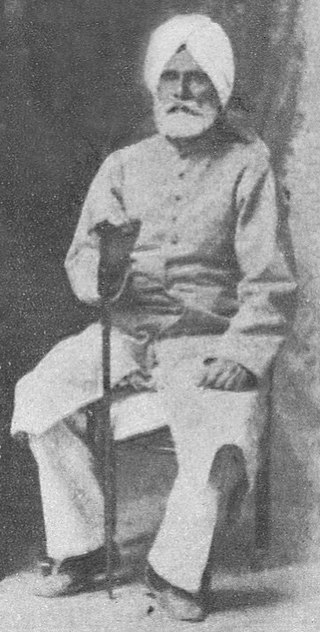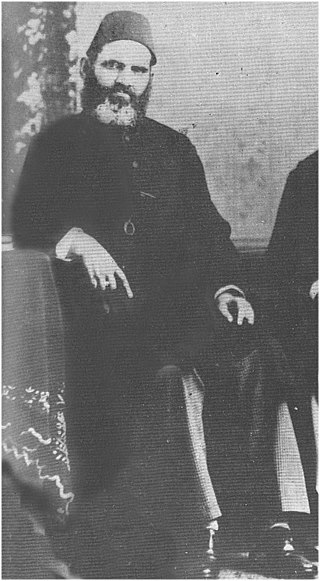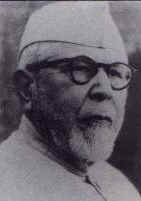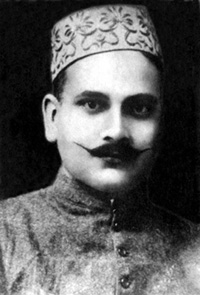
Aligarh is a city in the state of Uttar Pradesh in India. It is the administrative headquarters of Aligarh district, and lies 342 kilometres (213 mi) northwest of state capital Lucknow and approximately 130 kilometres (81 mi) southeast of the capital, New Delhi. The cities and districts which adjoin Aligarh are: Gautam Buddha Nagar, Bulandshahr, Sambhal, Badaun, Kasganj, Hathras, Etah and Mathura. As of 2011, Aligarh is the 53rd most populous city in India.

Sir Syed Ahmad Khan, also spelled Sayyid Ahmad Khan, was an Indian Muslim reformer, philosopher, and educationist in nineteenth-century British India.

Altaf Hussain Hali, also known as Maulana Khawaja Hali, was an Urdu poet and writer.

Urdu literature comprises the literary works, written in the Urdu language. While, It tends to be dominated by poetry, especially the verse forms of the ghazal and nazm, it has expanded into other styles of writing, including that of the short story, or afsana. Urdu literature is popular mostly in Pakistan, where Urdu is the national language, and in India, where it is an Eighth Schedule language.

Shahjahan Begum was the Nawab Begum of Bhopal for two periods: 1844–60, and secondly during 1868–1901.

Nawab Mohsin-ul-Mulk, Munir Nawaz Jang, also known as Syed Mehdi Ali, was an Indian Muslim politician. He was a close friend of Syed Ahmed Khan, was involved in the Aligarh Movement and was one of the founders of the All India Muslim League in 1906.

Tonk was a princely state in India under the supervision of the Rajputana Agency of the British Raj. It was located primarily in the present-day Indian state of Rajasthan with small portions in Madhya Pradesh. The town of Tonk, which was the capital of the state, had a population of 273,201 in 1901. As a salute state, its ruler, styled the Nawab of Tonk, was granted a 17-gun salute. The state came to an end after the partition of India when the Nawab of Tonk acceded to India. At that time, it was the only princely state of Rajputana with a Muslim ruling dynasty.
Rahil Begum Sherwani was the founder of the All India Women's Muslim League. The AIWML was the women's wing of the All India Muslim League. It was inaugurated by Muhammad Ali Jinnah in Aligarh in 1938. She was the younger sister of the famous Indian scholar Haroon Khan Sherwani and the daughter of Haji Musa Khan Sherwani.

Islam in Uttar Pradesh is the second largest religion in the state with 38,483,967 adherents in 2011, forming 19 .26% of the total population. Muslims of Uttar Pradesh have also been referred to as Hindustani Musalman. They do not form a unified ethnic community, but are differentiated by sectarian and Baradari divisions, as well as by language and geography. Nevertheless, the community shares some unifying cultural factors. Uttar Pradesh has more Muslims than any Muslim-majority country in the world except Indonesia, Pakistan, Bangladesh, Nigeria, Egypt, Iran, Turkey, Iraq and Afghanistan.

Abdul Majeed Khwaja was an Indian lawyer, educationist, social reformer and freedom fighter from Aligarh. In 1920, he along with others founded Jamia Millia Islamia and later served its vice chancellor and chancellor.

The Kheshgi or Khaishgi is a prominent Sarbani Pashtun tribe and Imperial dynasty in South Asia, mainly in India and Pakistan.
Ghulam Rasool Mehr was a Pakistani Muslim scholar and political activist born in Phoolpur, a village in the district of Jalandhar, British India.

Loharu State was one of the princely states of India during the period of the British Raj. It was part of the Punjab States Agency and was a nine-gun salute state.
Masud Husain Khan was an Indian linguist, the first Professor Emeritus in Social Sciences at Aligarh Muslim University and the fifth Vice-Chancellor of Jamia Millia Islamia, a Central University in New Delhi.

Nawab Sir Muhammad Muzammilullah Khan Sherwani, Khan Bahadur (1865–1935) was a noted zamindar and politician from the United Province of British India.
Zay is a given name, nickname and surname. It may refer to:
The Aligarh Movement was the push to establish a modern system of Western-style scientific education for the Muslim population of British India, during the later decades of the 19th century. The movement's name derives from the fact that its core and origins lay in the city of Aligarh in Central India and, in particular, with the foundation of the Muhammadan Anglo-Oriental College in 1875. The founder of the oriental college, and the other educational institutions that developed from it, was Sir Syed Ahmed Khan. He became the leading light of the wider Aligarh Movement.
Ze Khe Sheen was an Indian poet and writer who wrote in the Urdu language and was also an activist for women's rights. She published her poetry under the pseudonyms Zay Khay Sheen and Nuzhat, as her conservative Muslim society did not permit women to write poetry or initiate movements upholding the rights of women. She belonged to a rich family of landholders of the Sherwani tribe. Her poems and ghazals in Urdu, which had a "female touch", had romantic appeal for young people.

Khwaja Atiqullah was a Bengali British Indian politician and member of the Dhaka Nawab Family.

The history of Aligarh Muslim University begins with the Aligarh movement, which was a movement to establish a Western style of education for the Muslims of British India. The movement was pioneered by Sir Syed Ahmed Khan, who founded the Muhammadan Anglo Oriental College in Aligarh. Sir Syed retired at Aligarh, and undertook the charge of raising funds for the college, and supervising the construction of the campus.

















